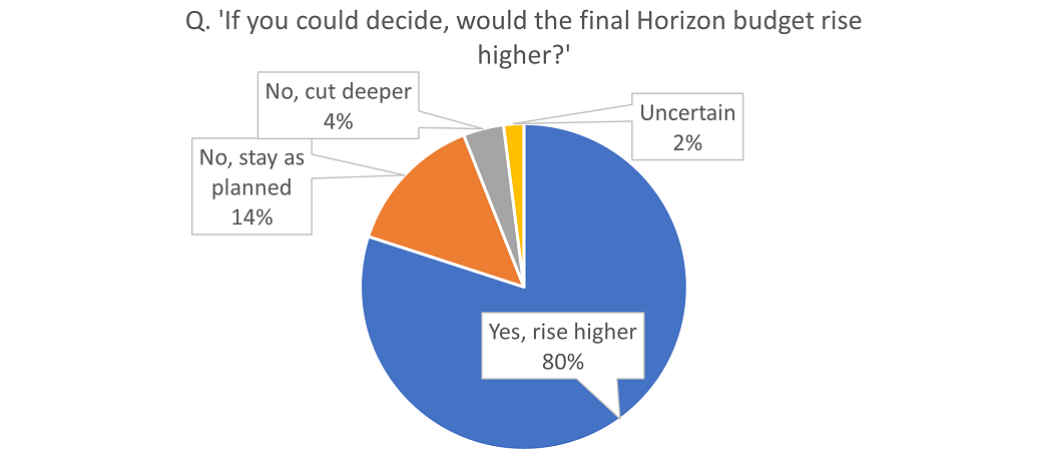Too much bureaucracy. Funds go always to the same ‘well lobbied’ actors’- is one complaint from Science|Business online poll

Source: Science|Business online survey 18 Aug. – 24 Sept., 501 respondents.
The European Union should increase the €80.9 billion budget currently planned for its Horizon Europe R&D programme – but it should also make it easier to apply for the funding, according to a survey by Science|Business.
Of 501 respondents to the online survey, 80 per cent said the proposed budget should rise higher than planned, while just 4 per cent said it should be cut. “R&D is absolutely the best use of taxpayers’ money,” is how one anonymous respondent put it. Wrote another: it “is the best answer to world-wide competition.”
But that doesn’t mean everybody’s happy with EU R&D programmes. Nearly half, or 46 per cent, of respondents said they aren’t easy to apply for. They are “too difficult to manage, with too many constraints, well-meaning but difficult to execute,” wrote one respondent. Said another: “Too much bureaucracy. Funds go always to the same ‘well lobbied’ actors.”
The survey, conducted online among Science|Business readers from 18 August to 24 September, adds a counterpoint to a noisy policy battle over the EU’s budget – with the Horizon seven-year budget plan slashed by EU leaders in July to €80.9 billion from the Commission’s original plan for €94.1 billion. On 29 September, EU research and innovation ministers are due to meet to discuss how to carve up the smaller budget among different parts of Horizon – from fundamental research to business R&D. The European Parliament is pushing to restore some of the money this Autumn.
As made clear from the survey, the Horizon budget and how it is allocated is a hot topic in the EU research and innovation world. When offered a “write-in” to describe the one thing most in need of change in the programme, more than half the 501 respondents grabbed the opportunity. The budget bothered many: one person suggested raising an extra €40 billion for Horizon by recovering funds “from the fight against tax avoidance.”
But politics and bureaucracy also bothered many. “Make it less political and more competitive,” wrote one respondent; “it is not social welfare.” Another complained about “too formal process. Too much about form and not content. Get better evaluations.” Another, arguing that Horizon has not “catapulted the EU in a world leadership position” or brought eastern and western Europe together as planned, urged “a whole new, deep, and broad strategic reassessment.”
But despite individual complaints, the broad majority of respondents have a warm and fuzzy feeling about Horizon. About 46 per cent “agree strongly” that it strengthened the EU, and another 33 per cent “agree somewhat.” Likewise, 70 peer cent agreed (strongly or somewhat) that it has had a big impact on European society and economy.
Coming next week: How to divide up the Horizon budget – more survey results.





 A unique international forum for public research organisations and companies to connect their external engagement with strategic interests around their R&D system.
A unique international forum for public research organisations and companies to connect their external engagement with strategic interests around their R&D system.